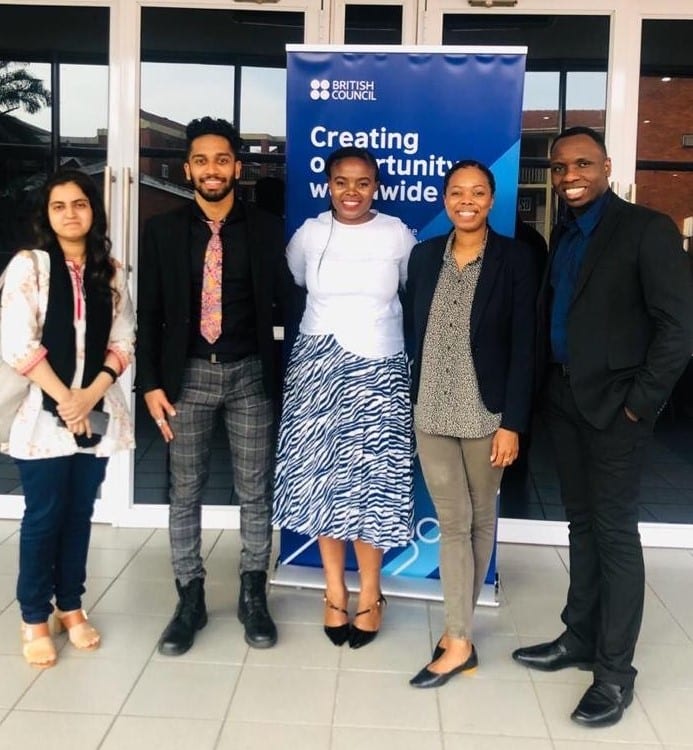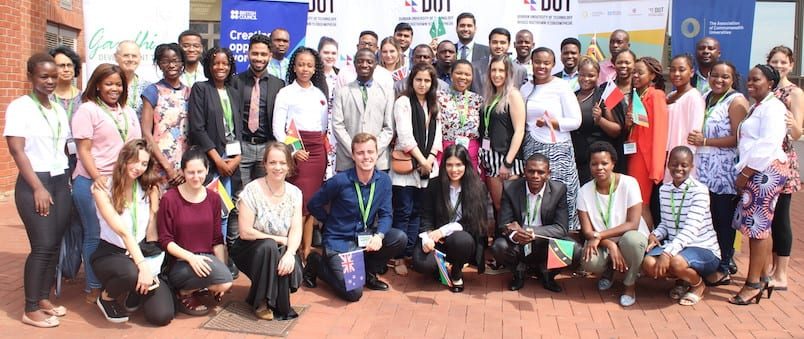June 2020
By Dr Chrisostomos Muwonge
The third Commonwealth Futures workshop was held from 11 to 14 March 2020 in Durban, South Africa. This workshop marked the end of a series of workshops organised by the Association of Commonwealth Universities (ACU), in collaboration with the British Council (BC) and the Commonwealth Secretariat. The workshop was held under the auspices of the Durban University of Technology (DUT) and it witnessed the participation of 30 young student leaders from 13 Commonwealth countries.
The topic, Reimagining Peace, drew upon the work of Mahatma Gandhi, a renowned Indian lawyer, activist, and peace movement leader. The series of workshops was in celebration of 150 years since Gandhi’s birth. There could never be any better timing for the last of the workshop series than hosting it in South Africa where Gandhi spent 21 years of his life in the struggle for peace and civil rights.
The main objective of the workshop was to combine delegates’ voices on the key issues that members of the Commonwealth face, both as citizens and as students in higher education, to feed into the next Commonwealth Heads of Government Meeting (CHOGM) which was to be held in Rwanda in June 2020 but had to be postponed due to Covid-19 pandemic.

LR: Shaza (Pakistan), Romil (Canada), Paballo (South Africa), Thuli (South Africa), Chrisostomos (Uganda)
Participants originated from numerous corners of the world. Through different exercises such as ‘standing ground’ where questions like ‘which of us has ever lost a loved one?’ I came to realise that despite having different genetic, cultural, and socio-economic backgrounds, all the participants in that room had much more in common than I had earlier anticipated. This exercise emphasised the participants finding common ground rather than focusing on individual differences. This kind of issue is important in relation to the current protests against racial discrimination in the world highlighting the value of unity as humanity.
The issue of climate change was one of the hot topics of the workshop sparking a lot of debate amongst the participants. According to Mr D’Sa, a prominent environmental activist in South Africa, the pursuit of environmental justice is a responsibility for all, and as students we should fight hard for environmental safety and advocate for it at every opportunity. Having heard personal and expert opinions regarding this issue, I realised that there was so much more to this than I had thought or read about. I felt the pain of the people directly affected by environmental neglect like those suffering from cancer linked to oil spills in Durban.
My most important learning experience was through a group of delegates who explained in detail how their various universities are dealing with gender-based violence (GBV) on university campuses. This has been achieved through the use of mobile apps that can be used to report and track GBV cases and the installation of ‘secure points’ which are places where students meet trained security personnel, who help to get them to their places of residence safely. Student clubs against GBV have also been created to provide support and information regarding GBV.
During the workshop we were divided into groups. My group a chose to discuss the issue of educational injustice affecting students from low-income countries with regard to attaining a higher-education degree from Commonwealth countries. We came up with suggestions, some of which, I am glad to say, are already being implemented at the University of Nicosia. We agreed that as student leaders we should encourage universities and other institutions of higher education to provide more scholarships to candidates on both academic merit and to those coming from underprivileged regions of the world in order to help to narrow this gap.
I commend UNIC for its partnership in the ACU, and I believe this will provide a huge learning experience for all students especially in matters of global problem-solving and leadership, just as it was for me.
I would like to thank UNIC and the ACU for this unique learning opportunity, and I look forward to sharing the knowledge acquired in the future.

